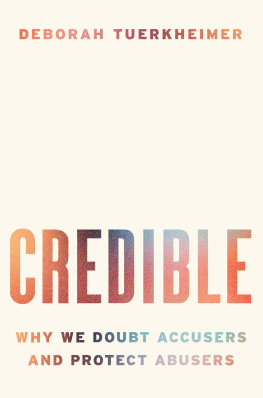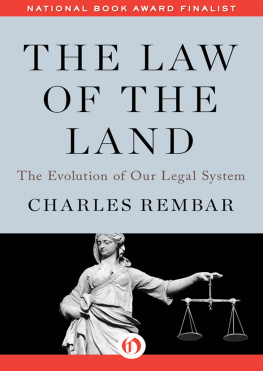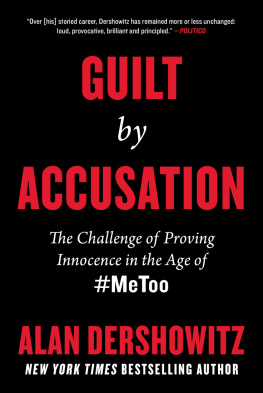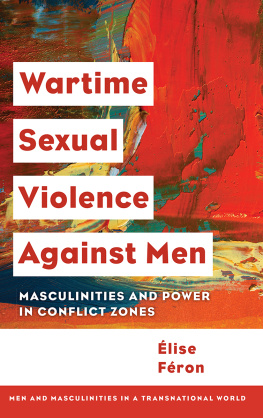Contents
Guide
CREDIBLE . Copyright 2021 by Deborah Tuerkheimer. All rights reserved under International and Pan-American Copyright Conventions. By payment of the required fees, you have been granted the nonexclusive, nontransferable right to access and read the text of this e-book on-screen. No part of this text may be reproduced, transmitted, downloaded, decompiled, reverse-engineered, or stored in or introduced into any information storage and retrieval system, in any form or by any means, whether electronic or mechanical, now known or hereafter invented, without the express written permission of HarperCollins e-books.
Cover design by Jordan Wannemacher and Caroline Johnson
FIRST EDITION
Digital Edition SEPTEMBER 2021 ISBN: 978-0-06-300276-0
Version 08232021
Print Edition ISBN: 978-0-06-300274-6
For Survivors
Contents
The stories that I share in Credible represent a range of experiences associated with the aftermath of sexual assault and harassment. Without a doubt, countless stories of how courageous people experience this aftermath could have appeared in the pages that follow. I have elected to highlight cases that portray patterns in our treatment of sexual misconduct accusers and amplify voices seldom heard. The chosen stories reflect both commonalities and particularities in the experience of coming forward with allegations of abuse. On occasion, names and identifying characteristics have been changed to protect privacy.
I use the words victim and survivor interchangeably unless one is suggested by context or the preference of the person described. Both words are intended to convey the harm of sexual misconduct; the nonlinear, often incomplete process of healing; and the strength it takes to persevere in the wake of abuse. As the author Donna Freitas writes, I am both a survivor and still a victim, and somehow I will always and forever be both.
While boys and men are also victims and survivors of sexual misconduct, it is no coincidence that the vast majority of abuse victims are girls and women. Nor is it surprising that most abusers are men. My use of gendered pronouns to reference perpetrators and victims depicts abuse that is typical in that it involves a male perpetrator and a female victim. For perpetrators, the same power that can be leveraged to prey on vulnerability confers protection from consequences. Most sexual misconductstill todaygoes unaddressed, leaving intact the hierarchies that enable it. Gender is inseparable from sexual violence and its aftermath. This reality shapes the stories that follow.
One morning in late February 2020, I approached the Criminal Courts Building in lower Manhattan, where I worked as a prosecutor in the early years of my career. Back then, I specialized in gender violence cases, many of which I remember well. Those casesand especially the victimswere on my mind as I made my way into the courthouse. What brought me back that day was the case against Harvey Weinstein. Id been following the monthlong trial closely from my perch at Northwestern University. Now I could finally observe the proceedings in person.
I was in the courtroom when, after five days of deliberations, the jury announced it had reached a verdict. This fact alone was extraordinary. The vast majority of sexual assault complaints never result in an arrest, much less charges, a prosecution, or a conviction. Around the country, only an estimated 20 percent of sexual assault cases reported to the police lead to an arrest. In some jurisdictions, the arrest rate is even lower. Those allegations that do somehow make it to trial tend to be more vexing for jurors when the accuser and accused are acquainted, as we know. And when the accused is a powerful man, accountability is the rarest of exceptions to the general rule of impunity.
Weinsteins path to the courtroom catalyzed what felt like a new era. Almost two and a half years earlier, groundbreaking reporting on the Hollywood moguls predations turned whispers into a loud chorus of public accusations. The hashtag #MeToo went viral. People from all walks of life came forward to share their stories, exposing abuse in publishing, fashion, music, sports, advertising, comedy, philanthropy, hospitality, retail, law, factories, academia, technology, places of worship, politics, and more. This was over a decade after Tarana Burke began the Me Too movement, which was in fact designed to empower survivors of sexual
After #MeToo went viral, activists and advocates capitalized on the momentum to demand systemic change. They achieved several notable successes. The use of nondisclosure agreementsa key issue that gained major attention when Weinsteins decades-long use of NDAs to keep women silent came to lightwas restricted in more than a dozen states. A few states expanded their definition of sexual harassment to encompass a broader range of behaviors, including less severe harassment, and to protect more victims, like independent contractors and interns. And several states extended the statute of limitations for filing a sexual harassment claim.
Despite these initial successes, efforts to reform our institutions and the culture surrounding them have all but stalled. Hard-fought legal gains fall well short of where we need to be. Still today, across the states and in federal court, in both civil and criminal cases, even the most evolved jurisdictions preserve laws that downgrade the credibility of accusers.
The problem is worse outside the legal system. Here, our daily lives require urgent judgments about credibility. When a coworker tells you about an incident of harassment. When you hear quiet warnings about your boss. When a friend discloses a sexual assault, perhaps from long ago and perhaps from the recent past. When you learn on social media that one acquaintance has accused another of misconduct. When you read about the latest allegation against a politician, actor, or athlete you admire.
Judging credibility is a mighty powerbecause credibility is itself a form of power. Whenever we judge credibility, we are in a position to value, or to devalue, the speaker. Yet as a society and as individuals, we wield this power in troubling ways. This is true of even the best intentioned among us, including those fully open to the lessons of #MeToo.
Unbeknownst to us, we are shaped by a cluster of forces that I call the credibility complex. These forces corrupt our judgments, making us too prone to both discount the credibility of accusers and inflate the credibility of the accused. The most vulnerable women experience credibility discounting at its most extreme, while men who are protected by greater status or position are the beneficiaries of massive credibility boosts.
There are two major drivers of the credibility complex. The first is culture. The credibility complex penetrates the deepest layers of our culture, which we can think of as our communal system of meaning, however contested. The social anthropologist Adam Kuper defines culture as a matter of ideas and values, a collective cast of mind. Fractured though our shared system of meaning is, it exists. Whats key here is that this culture cannot be isolated from a social context defined by stark power imbalances. In the stories that follow, hierarchies, inequalities, vulnerabilities, and privileges all play a pivotal role.
A main way our culture is refracted is through the behaviors and attitudes of individuals. Youll see in the chapters that follow that the credibility complex is powered by people. Some of these people work within systems that routinely mete out credibility discounts and credibility boosts. Police officers, school officials, and workplace personnel figure prominently in the accounts to come. So do friends, roommates, parents, and coworkers. None of us can transcend cultural norms or avoid their imprint on our inner workings. As cultural psychologists recognize, the human psyche is both a product of culture and a producer of it. When it comes to the credibility complex, individual psychology mirrors









